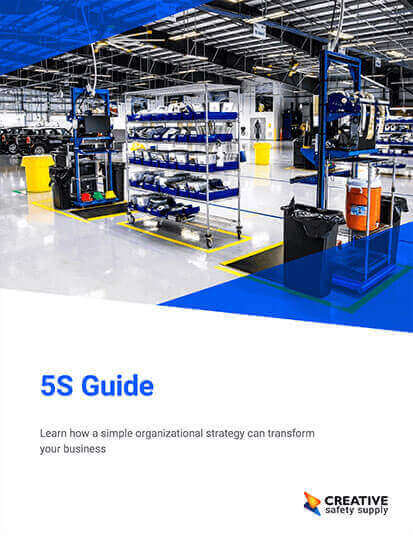
Focusing on optimizing processes in the workplace for improved productivity, the 5S methodology is proven to help organizations enhance their operations. Some business owners choose to appoint a designated 5S team who are responsible for implementing the practices and keeping track of the changes made. It is a good idea to have representatives from all departments within an organization involved in 5S discussions to achieve a diverse outlook that overlooks all operations within the business. In this article, we breakdown the 5S methodology to create an example step-by-step guide that can help a business implement 5S for the first time.
Step 1: Sort
The best place to start is with a declutter of the workplace, sorting through all equipment, materials, and documents to see what is actually needed. By separating anything which is broken, outdated, or unused, it can free up storage space and be recycled or disposed of to remove all unwanted clutter. By sorting through the workspace, the remaining assets can be better organized and kept tidy, allowing employees to find what they need in a much more efficient manner. It is a good idea to get all employees involved in this process, encouraging them to sort through their work areas to take ownership of their space and ensure nothing that is needed gets disposed of.
Step 2: Set in Order
The second principle, set in order, focuses on arranging items in an organized and systematic manner. Now that the decluttering has been carried out, the remaining items can be laid out in a way that allows easy access to the most used tools and equipment, contributing to more streamlined processes as time spent searching is minimized. To create a visual storage system, utilizing color-coded labels is a good practice that groups items based on their use and allows employees to quickly find what they need by glancing at the different labels.
Step 3: Shine
Creating a team who take pride in their workspace contributes towards a clean and organized workspace for all, maintaining a pleasant working environment that maximizes productivity. Implementing a cleaning process for all employees at the end of their shifts to tidy away the equipment used and ensure surfaces are free of clutter and debris will help keep the new organization system in place. Regular audits can help ensure this cleanliness is enforced, encouraging employees to take ownership of their space and ensuring that health and safety standards are met by keeping the workspace free of hazards.
Step 4: Standardize
Once newly established processes have been put into place, documenting this and communicating it with all employees across the business is needed to ensure it sticks. Whether a training session is held, a team meeting is scheduled, or a company-wide email is sent out, enforcing new procedures will help make them consistent.
Step 5: Sustain
Fostering a continuous improvement culture ensures that the benefits of 5S can continue to be utilized, committing to the principles on an ongoing basis to continue providing benefits. Many companies find it useful to carry out regular meetings with employees from across the departments or implement a feedback box which employees can use as and when they have a comment or concern. By being open to new ideas and taking employee thoughts on board, areas for improvement can be identified which otherwise may have gone unseen completely.
Similar Questions
- What is the meaning of 5S? A Workplace Organization and Efficiency Guide
- What are the principles of 5S?
- How do you Boost Productivity With 5S?
- How does 5S increase workspace productivity?
- How does 5S enhance efficiency and safety in healthcare?
- What are the best key performance indicators for 5S implementation?
- Why is 5S important in the workplace?
- How do you implement 5S in Office Environments?
- What is Lean 5S? Improving Workplace Organization and Efficiency

